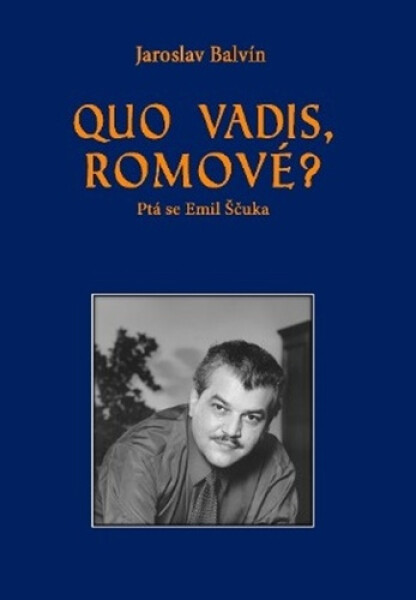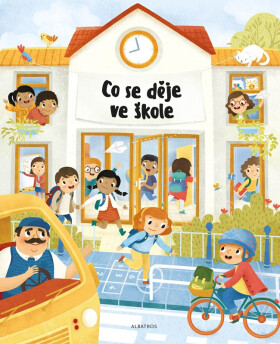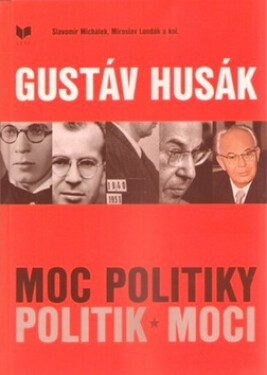QUO VADIS, ROMOVÉ? PTÁ SE EMIL ŠČUKA br br Kniha s názvem Quo vadis, Romové? Ptá se Emil Ščuka se zaměřuje na analýzu činnosti jedné z nejvýznamnějších romských osobností v České republice i v mezinárodním společenství. Předmětem knihy je nejenom osobnost Emila Ščuky a její význam v romském emancipačním hnutí, ale i vystižení historických, politických a filozofických souvislostí, které charakterizují moderní české dějiny. Fotodokumentace ze života a působnosti JUDr. Emila Ščuky doplňuje jednotlivé kapitoly předkládané knihy. br Quo vadis, Romové? Kam kráčíte, Romové? Otázka, kterou si celý život pokládá jedna z nejvýznamnějších osobností moderních dějin romského národa u nás i v Evropě. Romský lídr, právník, někdejší politik a vizionář Emil Ščuka, který zasvětil svůj život obrodě svého národa. Muž, který celý život bojuje za práva Romů a nebojí se klást nepříjemné otázky – sobě, společnosti i Romům samotným. Na zásadní otázku „Quo vadis, Romové?“ tentokrát odpovídá v knize Jaroslava Balvína. Publikace na více než 350 stranách mapuje životní příběh Emila Ščuky v souvislostech – osobních, profesních i historických. Zároveň přináší podrobný pohled na klíčové momenty romského národního obrození. Kniha není jen pohledem do minulosti – je inspirací pro budoucnost. br Svorníkem mezi osobností Emila Ščuky a novodobou historií romského národa je rok 1989. Sametová revoluce otevřela i Romům cestu k dosud nepoznané emancipaci a uplatnění ve společnosti. Avšak kniha ukazuje, že tento proces romského národního obrození nebyl jednoznačný a nekonfliktní. Při realizaci historického úkolu romského národa se plně prosadila osobnost Emila Ščuky jako vůdčího činitele při realizaci romského národního obrození a harmonizaci vztahů ve společnosti mezi Romy a neromskou majoritou. Reprezentoval a obhajoval veřejně zájmy romského národa. br br br br QUO VADIS, ROMA? ASKS EMIL ŠČUKA br br The book entitled Quo vadis, Roma? focuses on the analysis of the activities of one of the most important Roma personalities in the Czech republic and in the international community. The subject of the book is not only the personality of Emil Ščuka and its significance in the Roma emancipation movement, but also the description of the historical, political and philosophical contexts that characterize modern Czech history. Photodocumentation from the life and activity of JUDr. Emil Ščuka completes the individual chapters of the presented book. br Quo vadis, Roma? Where are you going, Roma? This is a question that one of the most important figures in the modern history of the Romani people in this country and in Europe has been asking himself all his life. Emil Ščuka, a Romani leader, lawyer, former politician and visionary who dedicated his life to the revival of his nation. A man who has spent his entire life fighting for the rights of the Roma and is not afraid to ask uncomfortable questions - of himself, of society and of the Roma themselves. To the fundamental question Quo vadis, Roma? this time in Jaroslav Balvín's book. The book, which covers more than 350 pages, maps the life story of Emil Ščuka in its personal, professional and historical context. It also provides a detailed look at the key moments of the Romani national revival. The book is not just a look into the past - it is an inspiration for the future. br The link between the personalities of Emil Ščuka and the modern history of the Roma nation is the year 1989. The Velvet revolution also opened the way for the Roma people to a emancipation and application in society. However, the book shows that this process of the Roma national revival was not unequivocal and non-conflicting. In the implementation of the historical task of the Roma nation, the personality of Emil Ščuka as a leading figure in the implementation of the Roma national revival and the harmonization of relations in society between the Roma and the non-Roma majority fully prevailed. He represented and publicly defended the interests of the Roma nation.







